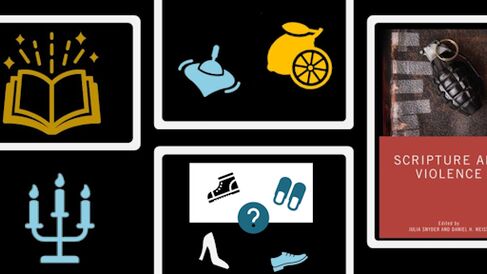CIP Skills
Linking Divinity research with contemporary issues & featuring some special guests, the CIP skills series explores the relevance of Theology, Religion & Philosophy of Religion outside academia.
It also provides opportunities for students to engage with external organisations working to enhance inter-religious understanding.
The series is designed primarily for students in the Faculty of Divinity. Sessions may be open to other members of the University, subject to availability.
Sessions in the current academic year
Scriptural Reasoning: an introductory workshop | 21 October 2025, 13:00-14:30
Introducing a structured dialogue practice. This is chance to give Scriptural Reasoning a go. Depending on interest, Professor Daniel Weiss may also convene a series for those interested in learning how to facilitate this practice effectively.
Skills day | Wednesday 21 January 2026
A day of interactive workshops. View details and book a place (Cambridge only).
Practicalities
Places are limited. Some sessions will run online and some on site at the Faculty of Divinity.
Past sessions
Sessions in previous years have included:
Communications | With the Religion Media Centre
A bridge between religious communities and newsrooms, the Religion Media Centre works alongside journalists and other media professionals to explain, enhance and encourage the reporting of religion, and thus understanding in society. One of the RMC team joined us to discuss patterns of change in media engagement and what this means for academics and media professionals.
Challenging assumptions | With Professor Daniel Weiss
Daniel Weiss is deputy director of the Cambridge Interfaith Programme and co-lead of CIP’s Scripture & Violence project. This session introduced a UK immigration case study to explore the treatment of scriptural texts in real-world legal cases. The session opened wider questions about public officials’ religious literacy (or lack thereof) and the power of texts within and beyond contemporary religious communities.
Rediscovering value | With Dr Anastasia Badder
In autumn 2023, Dr Anastasia Badder was commissioned to research the value and meaning of water for local religious communities. This work was funded by Ofwat, with findings reported back to a wider project exploring routes to water efficiency. The research and an advisory role on the ongoing Ofwat project raised fresh questions about how we understand value—in religion and in industry. Can religious scholars influence what happens in the boardroom?
Value propositions | With Cambridge Enterprise
Cambridge Enterprise supports University of Cambridge staff and students to explore the value of their ideas for external stakeholders. Using the concept of “value propositions”, this interactive session came with the invitation to look at research differently: Who benefits from the tools and knowledge created through religious studies?
Future sessions
The following sessions have been postponed, pending rescheduling:
Interfaith Photovoice | with Dr Roman Williams
Roman Williams is a sociologist of religion by training. But the “of”-ness of his role proved troubling. Moved to action following the 2016 US presidential election and a conversation with an influential interfaith actor, Williams reapplied his academic practices as a means of forging meaningful connections between people of faith. Discover the practice of Photovoice and its relevance for inter-religious understanding.
Countering bias | With Dr Julia Snyder
It is one thing to diagnose patterns of bias. Helping others recognise and change longstanding habits is a whole other challenge.
An affiliated lecturer in the Faculty of Divinity, Dr Julia Snyder teaches New Testament studies to people training to become priests and vicars in the Church of England. This session will explore the relevance of inter-religious learning in intra-religious spaces.
Critical empathy | With Professor Esra Özyürek
Esra Özyürek is an anthropologist and (since 2020) the academic director of the Cambridge Interfaith Programme. Fieldwork with Muslim communities in Germany led her to reexamine the concept of empathy, with reference to integration programmes and Holocaust education.
In this session, we will explore this territory with her, asking: What is empathy? Why do people teach it? What questions should we consider before soliciting empathy?

